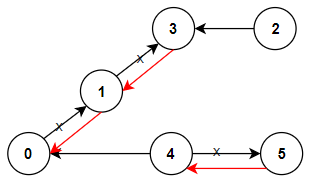There are
ncities numbered from0ton-1andn-1roads such that there is only one way to travel between two different cities (this network form a tree). Last year, The ministry of transport decided to orient the roads in one direction because they are too narrow.Roads are represented by
connectionswhereconnections[i] = [a, b]represents a road from cityatob.This year, there will be a big event in the capital (city 0), and many people want to travel to this city.
Your task consists of reorienting some roads such that each city can visit the city 0. Return the minimum number of edges changed.
It's guaranteed that each city can reach the city 0 after reorder.
Input: n = 6, connections = [[0,1],[1,3],[2,3],[4,0],[4,5]] Output: 3 Explanation: Change the direction of edges show in red such that each node can reach the node 0 (capital).Input: n = 5, connections = [[1,0],[1,2],[3,2],[3,4]] Output: 2 Explanation: Change the direction of edges show in red such that each node can reach the node 0 (capital).Input: n = 3, connections = [[1,0],[2,0]] Output: 0
2 <= n <= 5 * 10^4connections.length == n-1connections[i].length == 20 <= connections[i][0], connections[i][1] <= n-1connections[i][0] != connections[i][1]
- mine
-
Java
Runtime: 4 ms, faster than 100.00%,Memory Usage: 62.2 MB, less than 100.00% of Java online submissionspublic int minReorder(int n, int[][] connections) { int res = 0; int[] t = new int[n]; t[0] = 1; for(int[] c : connections){ if(t[c[1]] == 0){ res++; } t[c[0]] = 1; t[c[1]] = 1; } return res; }pass all the leetcode test case, but not correct if test case like:
3 [[1,2],[2,0]] 6 [[2,3],[3,1],[1,0],[4,0],[4,5]] 3 [[2,1],[0,2]]
-
-
the most votes
Runtime: 15 ms, faster than 100.00%, Memory Usage: 55.5 MB, less than 100.00% of Java online submissionspublic static int dfs(List<List<Integer>> g, int curr, boolean[] visited) { visited[curr] = true; List<Integer> adj = g.get(curr); int ans = 0; for(int i = 0; i < adj.size(); i++) if(!visited[adj.get(i)]) ans += 1 + dfs(g, adj.get(i), visited); return ans; } public int minReorder(int n, int[][] connections) { List<List<Integer>> g = new ArrayList<>(); for(int i = 0; i < n; i++) g.add(new ArrayList<>()); int m = connections.length; for(int i = 0; i < m; i++) { int sv = connections[i][0], ev = connections[i][1]; g.get(sv).add(ev); } boolean[] visited = new boolean[n]; int ans = 0; for(int i = 0; i < n; i++) if(!visited[i]) ans += dfs(g, i, visited); return ans; }

